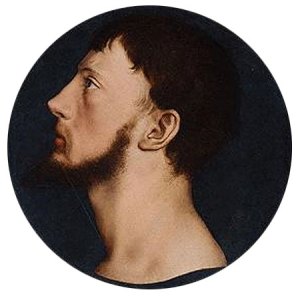Sir Thomas Wyatt (1503-1542)
They flee from me that Sometime did me Seek
I have seen them gentle, tame, and meek,
That now are wild and do not remember
To take bread at my hand; and now they range,
Busily seeking with a continual change.
Thanked be fortune it hath been otherwise
When her loose gown from her shoulders did fall,
Therewithall sweetly did me kiss
Into a strange fashion of forsaking;
I would fain know what she hath deserved.
I just came across this poem on my new favorite website. The language/culture/history barriers aside, I think, at first reading it is at least interesting. More interesting with this sexier picture of Sir Thomas. Really, wikipedia and Representative Poetry online, you make it hard to love a man! And, btw, he was over 6' tall, if that helps.
The comentary by Ian Lancashire is very helpful. But I am still a bit scandalized. I mean, look at the date up there! The man was alive in a time that conjures up some very strong imagery for me. But none of it includes a culture of diverse sexual affairs. Which is very naive of me, I know. I realize that for the species to survive, people were having sex. I just never imagined that they were...writing about it. Was this the type of poetry people talked about in polite company? I'm dying to know. And how was it that this kind of adultery was so widely accepted that poetry like this survived? And who was this woman, in the 1500s that was taking on a man who "lay broad waking" without any agenda aside from... recreation? Ian Lancashire tells us that this type of poetry is very rare. (I should think so!)
"Courtiers, like Henry, wrote love lyrics in pursuing a woman's sexual favours, but once seduced, unmarried women lost their power. Few men would complain, in lyrics, about being rejected by someone they had successfully bedded because they usually were fully prepared to move on to new sexual partners..."
So, what catagory of litterature is this? Was it the 1500s version of Cosmo? Its so very subtle, I have no idea if this is something people would giggle about in intimate company or if this would have been in the restricted (through time) to only men?
As for the mystery bird, that wild unfettered creature... I'll tell you what she deserved, Sir Thomas, she deserved some fragment of history to have preserved what it was like for a 16th century woman in the Court of Henry the VIII! Because apparantly, there really is nothing new under the sun. I find it facinating to find how people have always slipped into the margins of history. The things we know about Sir Thomas Wyatt are dry and boring speculation inside dates and facts. Judging by his poetry, he seems like a very complex and sensative character. I am fascinated.

No comments:
Post a Comment